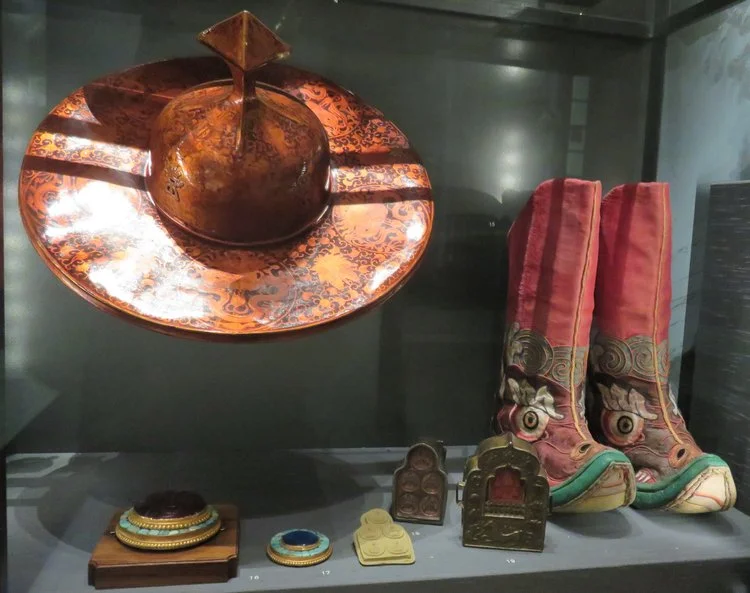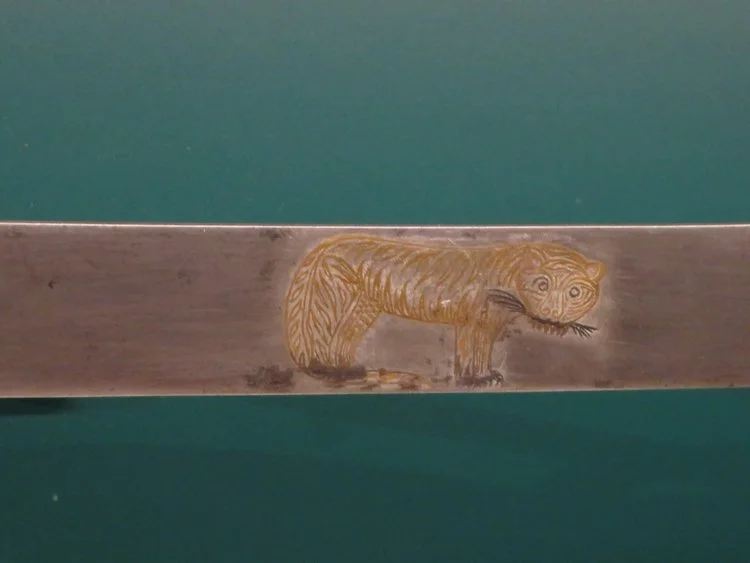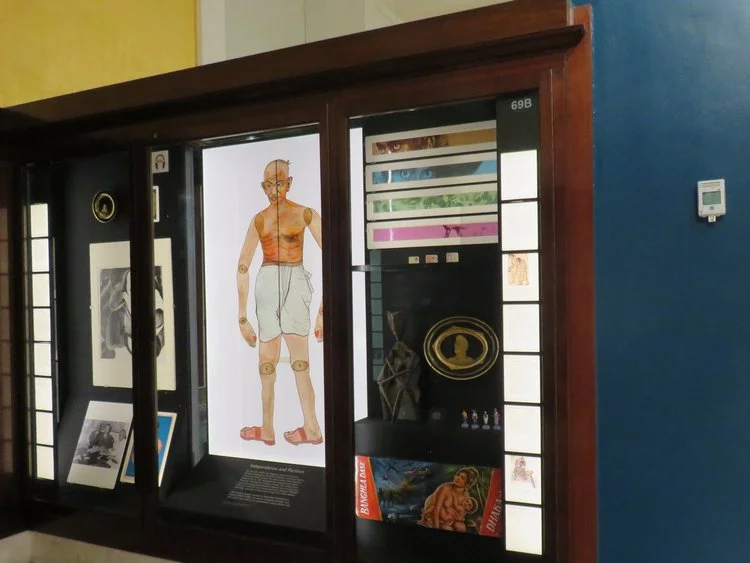For the latest instalment of our Paper Trails series, MBC volunteers Hannah McLean and Andrea Potts discussed their PhD research projects together.
Andrea: How would you describe your research?
Hannah: My research is in archaeology, specifically to do with contemporary archaeology, conflict archaeology, and critical heritage studies. I’m looking at the Mau Mau Uprising, which was an anti-colonial insurgency in Kenya from 1952 to 1960, fought against the British colonial government. There was a network of detention camps constructed by the British, which was referred to as the ‘Pipeline’. Most were dismantled at the end of the conflict, but some of the few surviving ones have been turned into schools and prisons. What I’m looking at is the archaeology of the camps that have been repurposed as schools.
Part of my methodology is using archaeological survey methods to look at the material culture of these camps and how they’ve been repurposed. I’m also conducting oral history interviews with some of the veterans who were detained in the camps, not only recording their stories and their experiences of detainment but working with them to produce their own maps of the camps. This is partly in contrast to the colonial narratives and documentation around the camps, but I’m also using the maps as an extension of the interviews, thinking about what we can learn about the way that the veterans are drawing the camps. What do they include or leave out, and what do they remember or forget?
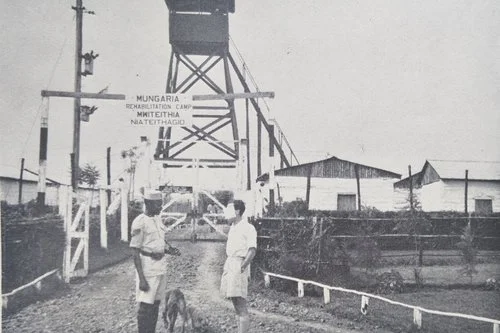
Photo of Aguthi Works Camp (also known as Mungaria Rehabilitation Camp) from Mau Mau Detainee by J.M. Kariuki (1963)
A: There are so many things that I want to ask you. Let’s start with oral history. Why did you select that method? How does oral history shed light on British colonialism?
H: I chose oral history partly because it’s just rare in archaeology to be able to do oral history work, at least with participants that have first-hand experience of what you’re researching. And I think when you can do oral history work, it nicely complements archaeological research. Sometimes when people do oral history with archaeology, they sort of pit them against each other, trying to use one or the other to disprove certain claims. But you can use it to understand individual experiences of the camps, for example, instead of trying to find out what the ‘true’ narrative is. Especially with colonial history and conflict archaeology, when you’re working with documentary sources that might misrepresent people’s experiences, I feel it’s owed to the veterans to understand their story and hear it from them. Especially with Operation Legacy, those personal experiences are not what we as the British public have heard for the past 50 years.
“Especially with colonial history and conflict archaeology, when you’re working with documentary sources that might misrepresent people’s experiences, I feel it’s owed to the veterans to understand their story and hear it from them. ”
A: Do you find that there is a tension between how you can use oral history to fill in gaps in the archives to find out about what happened in the camps – a history that has been actively concealed and suppressed – and using oral history to understand how memory works? That’s something that I’m grappling with in my research.
H: Yeah. I mean, one of the things that I find most interesting about oral history is the idea of ‘false memories’, or ‘discrepancies’ in how people remember things. There’s a couple of examples. Do you know Aleida Assmann? She wrote a book called Cultural Memory and Western Civilization. There’s a bit in it where she references Dori Laub, who interviewed a survivor of Auschwitz. She was talking about the rebellion at the camp and that they blew up four chimneys, even though only one chimney was blown up in the rebellion. Assmann talks about how the testimony might be factually wrong, but it tells you about how unprecedented that event was, and how much it meant to her. There was another one recently, I was in an oral history workshop, and the woman leading it, Alison Chand, did interviews with families about their experiences during the start of COVID. And she said loads of people remembered wearing masks in supermarkets in March 2020, but that wasn’t a thing, back then. Again, even though that’s factually wrong, you can tell something about their experiences during the pandemic – that masks have become so commonplace now. And that’s what I find most interesting about oral history and especially, like you said, understanding how memory works. How you can sort of tease things out from these accounts.
A: I find it interesting, and very revealing, that some types of sources are trusted in relation to this subject matter and some aren’t, right?
H: I think in maybe the last 20 years, oral history has become more – I think it’s become more popular to recognise that we can have false remembrances, but it doesn’t necessarily mean that it’s an invalid source. Before that I think a lot of people were dismissive of oral history, because it’s not a written record – as if written records can’t be the most biased sources. I was reading a review by Bethwell Allan Ogot of Caroline Elkins’ Imperial Reckoning. She used a lot of oral sources for her research, and there is definitely valid criticism about her work, but he said, ‘She always references anonymous colonial officers speaking badly about Gĩkũyũ and Mau Mau detainees’, and he wrote, ‘How can we trust that she hasn’t just made these up to reinforce her point?’ And well, I guess we can’t, but how can you trust that any historical source isn’t made up?
A: Right, and those kinds of arguments are only made to discount very specific narratives. It’s so interesting. I’ve come across this when I talk about MBC’s use of oral history. I come across the argument, ‘How do we know you didn’t just make it up?’ And it’s such a disorientating argument to be faced with which hinders critical conversations about what oral history is and what this research can do.
H: Especially when so many of the documents have been destroyed, and the ones that do survive, they’re from the perspective of the colonial government. Like, let’s question them too!
A: Let’s talk about contemporary archaeology. What is it?
H: Actually, when I was doing my undergraduate degree and partly during my Masters, I was so averse to theory. I couldn’t wrap my head around all the theory involved in contemporary archaeology, but I knew that I was really fascinated by the idea of applying archaeology to modern things, to structures and objects around us now.
“I was really fascinated by the idea of applying archaeology to modern things, to structures and objects around us now.”
A: The idea that everything is archaeology is really interesting.
H: Yeah. That’s how I would describe it, that anything and everything can be archaeology, if you look at it in a certain way. It also intersects with my other area of research, public archaeology, particularly in the sense of expanding the idea of what archaeology ‘is’ beyond, you know, pot sherds and trenches.
A: So are you thinking about what the repurposing of these camps tells us about how sites of violence are engaged with and negotiated in the long-term?
H: Yeah, I think with anti-colonial uprisings, there’s always some sort of tension in the present day country, but especially in Kenya, because Mau Mau was banned until 2003. And, as you know, a lot of the veterans live in poverty now. And because of the ban and the contentiousness of Mau Mau in Kenya today, I think it’s really interesting how the camps have been repurposed. How the students and the staff at the school live among the ruins of the camps. I think that at Mweru and Kangubiri at least, the students are aware that their schools used to be detention camps, especially in Mweru because they have a preserved torture cell. There was an essay that Lutivini Majanja wrote for an MBC exhibition at Baraza, she was a student at a school near Kangubiri, and she spoke with some of the former students about what it was like to go to school and live within this place that holds all this history and weight to it.
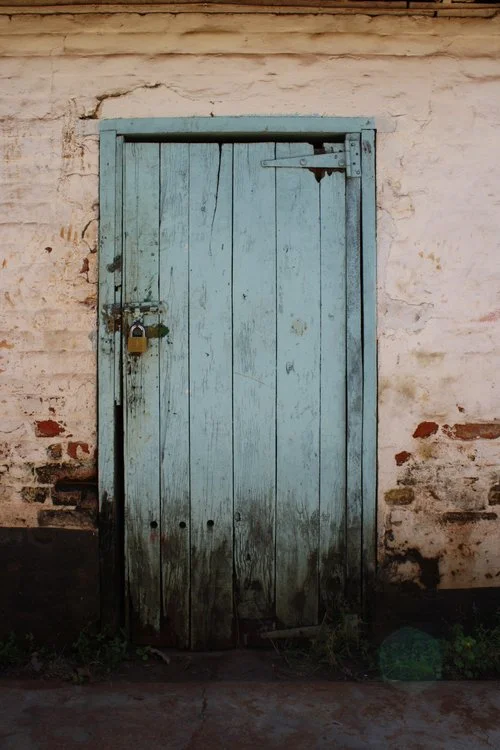
Door to a former confinement cell repurposed as a storage room at Kangubiri Girls High School, formerly Aguthi Works Camp. The door has been flipped upside down, but the spyholes used by colonial officers remain.
A: What motivates you to do this research? Why do you think it’s important?
H: There’s two main reasons. Firstly, just personally, I find it really fascinating. All the different aspects – how the camps have been repurposed, how they’re being lived amongst now, how they’re seen by the veterans and contemporary Kenyan society, why certain sites have been repurposed and some sites have been destroyed and things like that. I think it’s just really fascinating. But also when I was at school I never heard about the Mau Mau Emergency, let alone the empire. I think the more work that I can do, both in academia and working with MBC, you know, I’m happy to be able to share this history.
Hannah: So how would you describe your research?
Andrea: I look at contemporary museum exhibitions in Europe that represent the colonial past. I’m interested in understanding how these exhibitions mediate how people engage with the colonial past. What is the relationship between how colonialism is represented in museums and how people engage with the colonial? What impact do museums have on people? My research is positioned within museum studies and memory studies. My case studies are in the UK and Denmark because I’m interested in the role that national histories and memory cultures play but I also want to assess to what extent there is a transnational, European approach to exhibiting colonial histories.
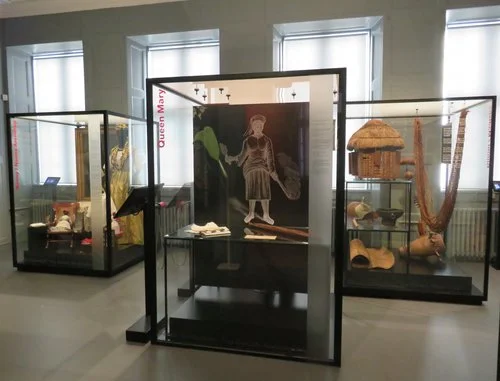
What is the relationship between how colonialism is represented and how people engage with the colonial?
A display in ‘Voices from the Colonies’, a permanent exhibition in The National Museum of Denmark
H: What research methods do you use?
A: I use several different methods, but interviewing members of the public is central to my research. I conduct ‘walking interviews’ with people in an exhibition. We walk around an exhibition together and discuss our responses to it. I am hoping that this method will produce a more in-depth understanding of what it means to engage with representations of colonial histories in a museum setting than standard ‘visitor research’ tools such as surveys. I’m particularly interested in the affective and emotive ways that people engage with exhibitions.
I’m also researching how these exhibitions are produced and how that shapes how the colonial past is represented. In doing so, I hope to develop a clearer sense of what the various contemporary approaches to exhibiting the colonial past are, using a vocabulary that moves beyond the often-vague notion of ‘decolonising’. I want to connect specific approaches to exhibiting colonialism with a stronger sense of what impact they each have on people. We need to place people at the centre of this, I think, to meaningfully evaluate the work that museums do.
“We need to place people at the centre of this, I think, to meaningfully evaluate the work that museums do.”
H: Yes, I was going to ask you about the word decolonising. There is a fair amount of discourse surrounding what the term means and how it is being used today.
A: Exactly, that’s one of the key motivations for my research. The exhibitions that I’m interested in are intentionally introducing more explicit representations of colonialism to the museum. Museums are doing so, at least in part, because they want to be more critical about how they represent colonialism. I don’t think of that as decolonising because this work is about centering colonialism in a critical way. I’m interested in thinking through what the function and impact of these representations is, without using the notion of decolonising to evaluate this. Can an exhibition be understood as anti-colonial? I’m also interested in the concept of the reparative, which relates to ideas of repair and redress, in contrast to the notion of harm and the perpetuation of historical wrongs. I would say that in museum studies and practice, we don’t yet have a strong sense of the actual, rather than intended, function of contemporary representations of the colonial past. So much has changed in recent years. I am hoping to contribute to moving this forward in a way that supports change within museums.
“Can an exhibition be understood as anti-colonial?”
H: Do you think that museums will ever be able to do anti-colonial work, without completely dismantling what a museum is?
A: I change my mind regularly! I think that it’s worth thinking about how museums can be changed and doing so in a way that doesn’t simply operate through a binary of success and failure. But then again, it’s important to ensure that the idea of change from within doesn’t end up acting as a barrier to radical change. I want radical change within the museum. And there are so many people working in museums who want this and do push for this – it’s about providing a body of evidence that can support and champion their work, while also showing what still needs to change and what needs to be better supported by museum trustees.
It’s also quite complicated to think about what we want museums to be and do in this current historical moment. Do we want museum exhibitions to confront the disavowal of historical colonial violence or the denial of the ongoing legacies of colonialism? How might that sit alongside a desire for these exhibitions to champion and celebrate anti-colonial resistance? Or to support a kind of healing? Can an exhibition do all of these things or are we expecting too much of museums? That’s why it’s so important for me to gather a broad range of perspectives in my research.
H: Without making this an advert for MBC, I guess that’s a key benefit of having a museum that isn’t embedded in colonialism!
A: Absolutely! It’s wonderful to be part of MBC and to have the opportunity to start from first principles about what would be the best way to represent this history? What would be the most accessible way or the best way to tell an accurate history? And in interviews that I’ve conducted with museum professionals, many talked about the constraints that were placed on them by the nature of their collection or the form of the building and things like that. MBC can bypass many of those issues to present the specific story that we want to tell. That doesn’t mean that I have given up on other museums altogether though!
Notes
Hannah McLean is a PhD student in Archaeology at the University of Glasgow. Her research interests include contemporary archaeology, conflict archaeology, and the heritage and archaeology of empire.
Andrea Potts is a PhD student in Museum Studies at the University of Brighton. Her research interests include museum curation and interpretation, colonial histories, and transnational memory cultures.
If you are interested in taking part in a ‘walking interview’ with Andrea in a museum in either London or Copenhagen, please contact Andrea directly via email (a.potts@brighton.ac.uk) or Twitter (@AndreaPotts22).
